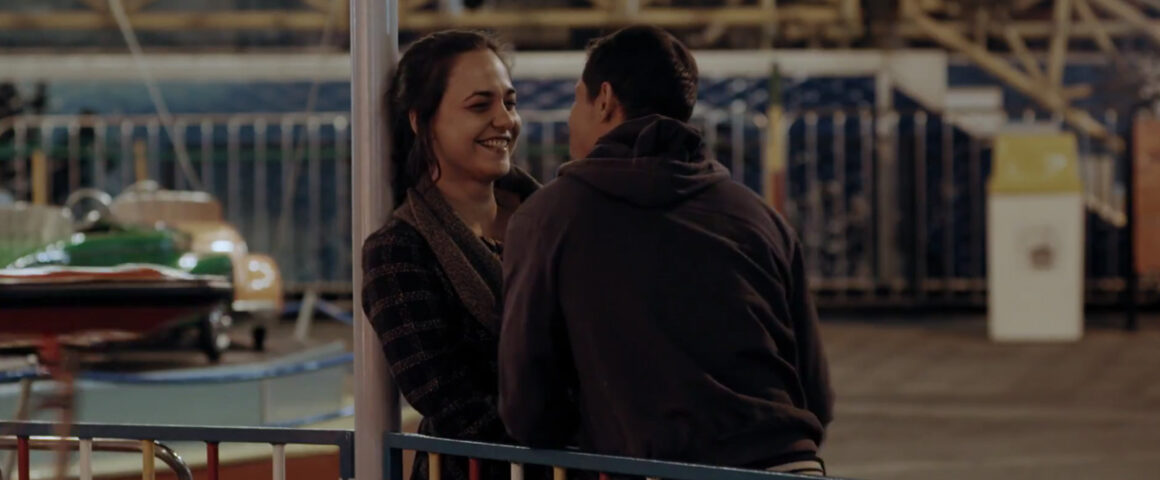“I’ve been havin’ some hard travelin’, I thought you knowed. I’ve been havin’ some hard travelin’, way down the road” — Woody Guthrie
According to Yann Martel, author of the Booker Prize-winning novel “Life of Pi,” “stories are important because everything is in how we perceive it and nothing is really real until we say it is.” The story told in Brazilian directors João Dumans and Affonso Uchoa’s (“The Hidden Tiger”) intimate and poetic Araby (Arábia) may not be “important” in the usual sense of the word, but it is a very real and universal one. The film chronicles the personal struggle of Cristiano (Aristides de Sousa, “The Hidden Tiger”), a factory worker in Ouro Preto, Brazil in the state of Minas Gerais, as he tries to redeem his life from a poor choice he made when he was younger.
Its title taken from a James Joyce story in “Dubliners” and reinforced by a joke told by a co-worker, the film opens as André (Murilo Caliari), a teenage boy living with his younger brother near an old aluminum factory, rides his bike down a lonely country road to the sound of Jackson C. Frank’s beautiful 1960s song “Blues Run the Game,” a cry from a similar traveler who lost his way. Looked after by their aunt Márcia (Gláucia Vandeveld, “Subybaya”) while the boys’ parents are “traveling,” André is told to collect Cristiano’s belongings and bring them to the hospital after he collapsed on the job. It is here that that Araby begins again, reconstituting itself as a road movie.
As narrated by de Sousa from the diary that André discovers among his possessions, Cristiano describes the one year, four months, and twenty-six days he spent in jail as a result of a car theft and his subsequent time on the road in small towns in Southeastern Brazil looking for odd jobs to stay alive. “I’m like everyone else,” he writes, “just that my life was a little bit different. It’s hard to choose something to tell,” he says, “because in the end all we have are memories of what we went through.” What Cristiano remembers constitutes the core of the film: The people he meets on the road, his political awakening, and his love affair with Ana (Renata Cabral), a secretary at a textile factory where he worked. “Everyone had a story,” he writes, “Even the quiet ones.”
There are no dramatic peaks and valleys but brief, poignant stories — vignettes that shed light on the daily experience of millions of laborers all over the world. The stories are punctuated by exquisite Brazilian, Tunisian, and American folk songs such as those of Brazilian composer Renato Teixeira, Tunisian musician Anouar Brahem, and Frank’s “Blues Run the Game,” which we hear more than once in the film. In his journal, Cristiano describes his work as a tangerine picker, handyman at a brothel, paver, trucker, and worker at a steel mill, all depicted with a dreamlike quality in which everything is understated, bordering on the surreal.
Even an incident where his truck runs over someone or something walking on the road late at night is murky and unclear. We hear a thump and then see Cristiano, fearful of going back to prison, burying something in the ground. Although there is variety in the circumstances of the people Cristiano meets along the way, they are bound together by a feeling of alienation and a search for “home.” There are some good times, however — banter with friends, tall tales true or invented, card games, and the songs that hide the blues. One of the focal points of the film is Cristiano’s relationship with Ana which, like many of his experiences, begins promisingly but ends unhappily after Ana’s miscarriage and their realization of how different they are.
A chance meeting on a tangerine plantation with an aging man named Barreto (José Maria Amorim) stirs Cristiano’s political awareness as he learns that the old man was once a labor organizer who fought for workers’ rights. “We sow so much, but reap so little,” Cristiano says prophetically. Finding out that no one on the farm is being paid, he complains to his boss who tells him that he has no money to pay his workers and, as Cristiano quits, he takes some tangerines with him to sell or eat on the road. When he finds an outlet for self-discovery in a theater group and is told to write something important about his life, he begins to put into words what he has been unable to express verbally.
Though Araby reminds us of social-realist films by Italian neo-realists and those of Belgian directors Jean-Pierre and Luc Dardenne, it is more a film about the human condition and of one person’s search for release from mental, physical, and emotional adversity. While the release is hard to find, the film lends a sense of nobility to his quest. As Cristiano’s mood darkens, however, and his “hard travelin” gets harder, he tells us that he feels “like an old, tired horse.” Realizing that the anchor that he has looked for to shield him from the long loneliness has become more elusive and his desire for “home” has become acute, it is clear that the blues have run the game.




'Movie Review: Araby (2017)' has no comments